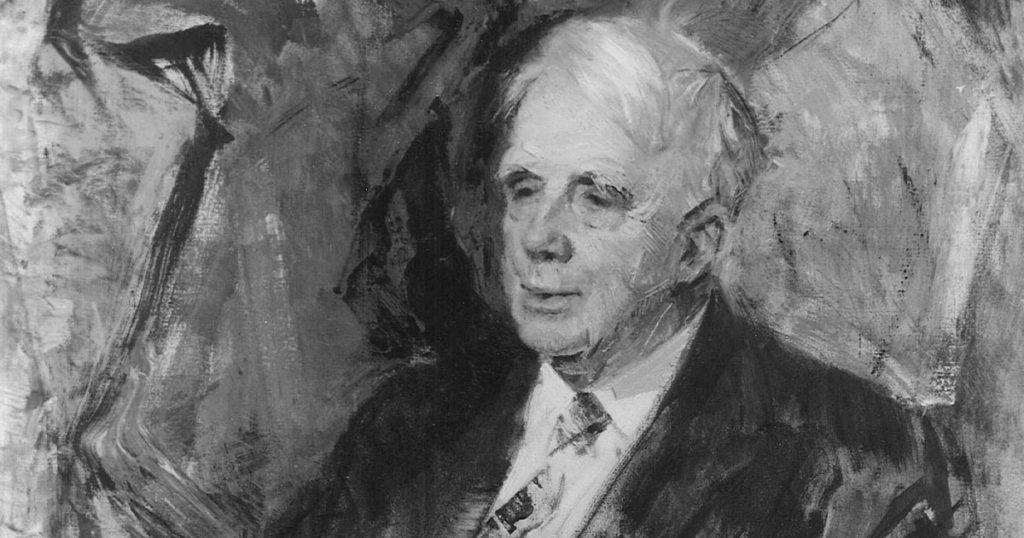
In the spring of 1963, I was a high school sophomore in southern Georgia when my English teacher introduced our class to the poetry of Robert Frost. Mrs. Love recited several of Frost’s shorter poems from memory that day, and one in particular—the single stanza “Fire and Ice”—grabbed my usually wandering attention. At the time, I was learning to play the guitar and trying to write some primitive songs. Poetry wasn’t on my teenage radar, but Frost’s work made me realize that it was possible to say something clever and powerful in a few short lines. As I listened to my teacher say the poems, I became curious what else Frost had written, so I picked up a paperback copy of a newly enlarged Pocket Anthology of Robert Frost’s Poems at the local Rexall drugstore.
I studied architecture at Georgia Tech until I was ready to concede that music, and songwriting in particular, was my true calling. I was in my 30s before I made any significant headway, but in 1987, to celebrate my first number-one hit—“Goin’ Gone,” sung by Kathy Mattea—I decided to look for a nice copy of Frost’s poems. At a friend’s used bookstore in Nashville, I found a first edition of West-Running Brook, illustrated by Virginia artist J. J. Lankes. The woodcuts caught my eye, and the heavy, rough paper, with its antique typefaces and generous margins, made it feel significant in my hands. Fifty dollars was more than I’d thought of spending, but that handsome little book was the spark for everything that followed. From then on, I used every new musical success as an excuse to buy another fine edition, eventually forming what amounted to a small collection.
I traveled all over the country singing my songs in those days, haunting the poetry sections of used and rare bookstores along the way. Fortunately Anne Bromer, one of my favorite booksellers, pointed me to the Joan St. C. Crane bibliography of the Frost collection at the University of Virginia. No longer was I searching in the dark without a map. That book, dry and technical as it was, awakened my interest in the arcane details of the books and artifacts themselves.
As my songs, such as “Unanswered Prayers,” performed by Garth Brooks, and “Small Town Saturday Night,” sung by Hal Ketchum, continued to top the charts, Frost and his oeuvre became my refuge from the pressures and demands of success. The spotlight inevitably dimmed as my career cooled down, but I continued to find satisfaction and delight in the poems, books, and artifacts. In 2001, I was invited to curate an exhibition of my collection at the Vanderbilt University Fine Arts Gallery. Afterward, Frost scholar Welford D. Taylor invited me to join a group of authors, professors, and archivists organized by one of the poet’s granddaughters, Lesley Lee Francis. I held my own during the annual meetings and discussions, and I began to appreciate just how much I knew about Frost and his published works.
Over the past 35 years, I’ve assembled more than 1,500 items, the majority of which I have cataloged in great detail. Many are unique or extremely rare—such as a five-page bound volume of poems-in-progress from Frost’s 1944–46 notebook, which he gave to his friend Charles Bolte, and the navy blue pin-dot tie he borrowed from his editor, Al Edwards, to wear for John Kennedy’s inaugural. Even the most ephemeral things, like a collection of amateur snapshots of a performance of A Masque of Reason, often provide interesting details, helping to fill out Frost’s grand narrative. I have loaned pieces to Frost exhibitions at Amherst College and other institutions, and I was a major donor of books to the Robert Frost Stone House Museum in South Shaftsbury, Vermont.
When a first edition of The Letters of Robert Frost, Volume Three arrived in the mail last year, I was astonished to discover that the editors had dedicated the book to me. It’s hard to imagine a more satisfying coda to this story that began innocently enough with a cheap drugstore paperback. Sixty years later, that now-fragile piece of “Frostiana” is resting safely in my office bookcase—third shelf, fourth volume from the left.

